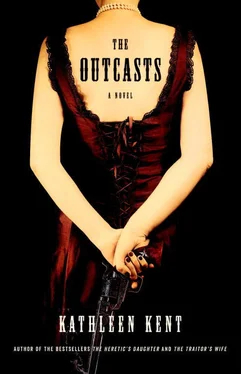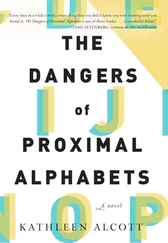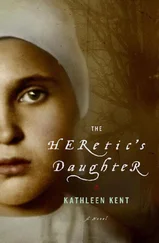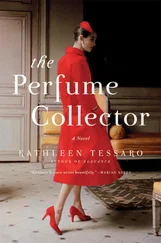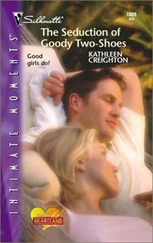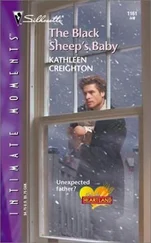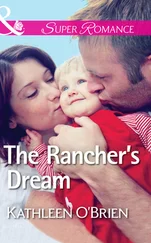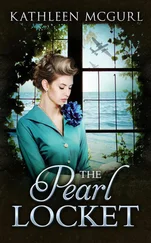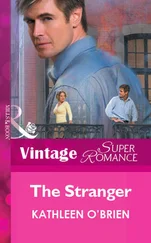Nate watched the engineer expertly twisting valves and wheels and checking gauges for pressure and water levels, and he wished he knew enough to even ask questions as to the function and purpose of the moving pieces. He caught Dr. Tom watching him, and the ranger smiled as though understanding Nate’s thoughts.
“I was never happier than when I was riding like this.” He leaned closer to Nate, his arms crossed contentedly. “Bituminous coal. That’s what we hauled. Soft, powdery stuff. Gets into everything. Especially the lungs.” He hooked a thumb at his ribs. “I think that’s what’s given me the cancer.”
Nate jerked his head around and saw his partner was telling him the truth. Dr. Tom placed a hand on Nate’s arm.
“Take this as a gift from me. You’ll never forget this. Always carry this moment, ’cause you may never in your life again feel this free.”
Nate’s sensation of falling returned as the engine made the slight rise onto the wooden crossing and the elevated tracks over the Gulf, the pale green colors of the shallows bottomed with sand quickly turning to the dense murk of deeper water. Before them stretched Galveston Bay, and the bridge that ran for miles across it to the island. The whistle was sounded in three long blasts, but the wind that tore in buffeting currents through the cab carried the sound away along with the steam.
The sun was low behind them, lighting the tight, triangular waves obliquely, and a shadow train flowed apace with them over the surface of the water. Giant gulls, their beaks open as though astonished at the train’s progress, veered low around the stack vent and followed them across the length of the bridge.
It was another few miles into Galveston along sandy flats and through to the middle of the town, which to Nate’s eyes was the finest he’d seen, surpassing even Austin in newness and the scale of its buildings. But a tension had started to grow in his gut that was more than the deep vibratory sensation of riding the engine. All he could think about was how dark the streets and alleyways were becoming as the train passed along them on its way to the rails’ end.
The terminus was an immensely long passenger station fronted by a square, red-brick freight building, and by the time Nate had stepped down from the engine, the sun had set and all of Dr. Tom’s loose-limbed camaraderie had evaporated. They unloaded the horses without mishap but for the stock loader who had a bandaged shoulder beneath a torn shirt and who came down the ramp swearing. He glared at Nate, saying, “That bastard horse of your’n bit me!”
With apologies, Nate handed the man a few dollars, and he mounted the bay, following after his partner, who rode directly to the nearest livery to feed and water the frayed horses. Dr. Tom paid the stable boy to bring some supper and they sat in the tack room checking their weapons by lantern light.
“First things first,” Dr. Tom said. “We ride to the pier and see after those ships leaving for New Orleans tonight.”
“And your—” Nate had started to say your wife, but he stopped himself. “And Lucinda?”
“If McGill’s here, she’ll be with him.”
Nate repacked dry powder in his revolver and when he was done, he saw that Dr. Tom had been watching him.
“There’s something else I need to tell you.” Dr. Tom took off his hat and rotated it around in his fingers, crimping the brim unnaturally. “A few years ago, just before she left for the last time, Lucinda came to me and told me she was in the family way. She seemed happy about it. I know I was. But within a few months, she started getting restless. She’d get silent and down in the mouth for long periods. Since she was a child, she’d been plagued with epileptic fits. With her pregnancy, her fits got worse for a while, and then they got better. A month before she was to deliver she ran away. Took George’s watch and a horse, some money of mine. I don’t know where she went, but more important, I don’t know what happened to the child, whether it’s even living or dead. I want you to promise me that regardless of what the outcome is for me, you’ll not stop trying until you get the answer from her. I have some money put aside at the rangers’ bank in Austin, and I have a sister in Buffalo. She should be told if the child is still alive.”
Nate nodded, but Dr. Tom said, “I need a promise on that.”
Nate in that moment had a presentiment, what his wife would have called a glimmering, that he was in the presence of a man making a last request. He said, “I promise.”
Dr. Tom put his hat back on and worked his mouth around a dry tongue. “I need something sweet to wash out this sour taste. Would you walk up the street to Henderson’s Dry Goods and get me some rock candy? Go on, now, Nate. I just need a minute to settle my nerves. When you get back, we’ll get this thing started.”
Nate walked out of the livery and turned right on the Strand. He hadn’t asked the way but decided Henderson’s must be farther into town. He walked slowly, giving Dr. Tom the time he asked for, and watched the traffic, the horses, pedestrians, and carts, still crowding the streets.
The sea wind had turned colder and he settled his hat more firmly on his head and turned up his collar. He nodded to a couple on the sidewalk, a boy on a horse, a man in a buggy, and looked on both sides of the street for a sign that said Henderson’s.
He glanced up at the storied buildings. Even with the few gaslights, the stars were legion, dimensional and sharp, and Nate thought there should be a new word to describe the luster over the Gulf sky.
He walked a few more blocks and then turned back, retracing his steps. He caught sight of his own profile in some glass fronting a shop with a sign that read Oceanside Lots for Sale. See Surveyor Inside.
The man in the buggy. The one he’d passed on the street. He’d seen the man only briefly in profile—bearded, spectacled—but the memory of sharing the ferry ride with McGill resurfaced and, immediately following, the recollection of his wife’s warning about staying away from rough water.
McGill had been riding in the direction of the livery. Nate turned and began to run, and two blocks away from the livery, he heard three distinct revolver shots, two fast and one following shortly after.
Drawing his own revolver, he cautiously entered the livery through the open stable door, but he already knew what he was going to find.
There was little doubt in Lucinda’s mind that Bill had meant to kill her on the seaside road in Galveston. Instead, he ran the fingers of one hand over her face and told her, “You go to work now, Lucy. And you’ll work until you’ve made up for all that’s been lost.”
He kissed her, his lips tasting of tobacco and brine, and pinched up her hair in his fingers, yanking it behind every word. “Every. Last. Dollar.”
And then he released her; her knees buckled with relief.
“The steamer Josephine departs the docks at midnight for New Orleans,” he said. “If you keep up a brisk pace, you’ll make it in time.” He climbed into the buggy. “Walk fast, Lucy. I need to know that you are still with me.” He chucked at the reins and headed out, alone, towards town.
She watched the buggy until it had disappeared into the darkness, but even then she could hear the faint sounds of the wheels crackling over the shells, like a plague of locusts departing.
She began walking rapidly, passing no one along the road, watching the tiny lights of boats slipping through the deep currents of the Gulf waters. It was cold, making her teeth clatter together, and she rubbed her hands up and down her arms for warmth. In the third hour of walking, the shells on the road started to cut through the leather of her shoes, and she trailed spatters of dark blood in the shale behind her like tiny starfish caught on dry land. But the wounding of her feet was a distraction from the frigid wind, and she welcomed the pain. She would later reveal her wounds to Bill as visible signs of her penance.
Читать дальше
